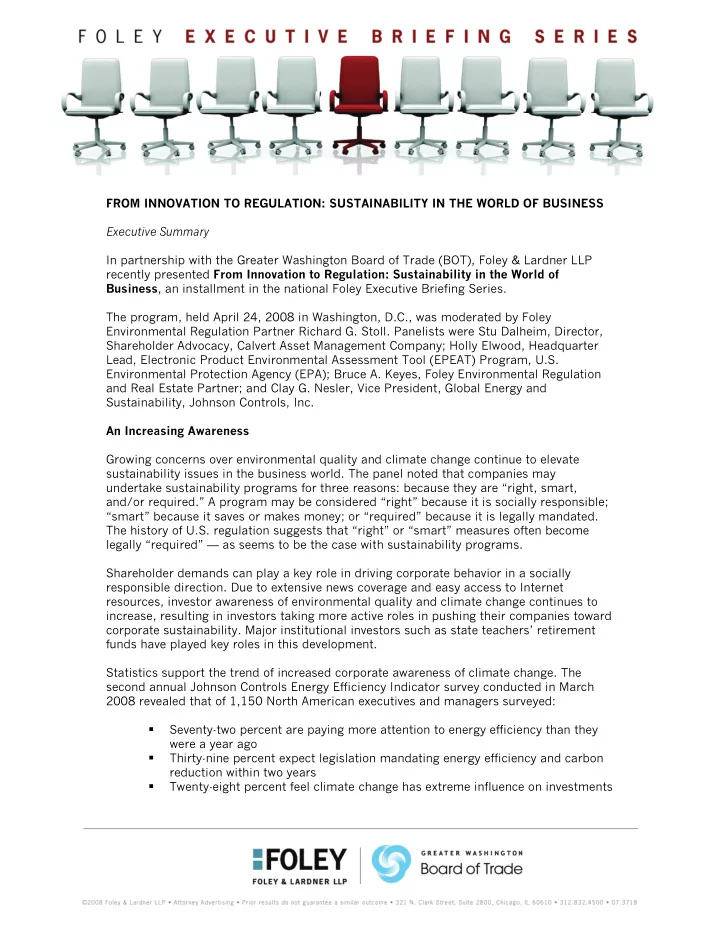

FROM INNOVATION TO REGULATION: SUSTAINABILITY IN THE WORLD OF BUSINESS Executive Summary In partnership with the Greater Washington Board of Trade (BOT), Foley & Lardner LLP recently presented From Innovation to Regulation: Sustainability in the World of Business , an installment in the national Foley Executive Briefing Series. The program, held April 24, 2008 in Washington, D.C., was moderated by Foley Environmental Regulation Partner Richard G. Stoll. Panelists were Stu Dalheim, Director, Shareholder Advocacy, Calvert Asset Management Company; Holly Elwood, Headquarter Lead, Electronic Product Environmental Assessment Tool (EPEAT) Program, U.S. Environmental Protection Agency (EPA); Bruce A. Keyes, Foley Environmental Regulation and Real Estate Partner; and Clay G. Nesler, Vice President, Global Energy and Sustainability, Johnson Controls, Inc. An Increasing Awareness Growing concerns over environmental quality and climate change continue to elevate sustainability issues in the business world. The panel noted that companies may undertake sustainability programs for three reasons: because they are “right, smart, and/or required.” A program may be considered “right” because it is socially responsible; “smart” because it saves or makes money; or “required” because it is legally mandated. The history of U.S. regulation suggests that “right” or “smart” measures often become legally “required” — as seems to be the case with sustainability programs. Shareholder demands can play a key role in driving corporate behavior in a socially responsible direction. Due to extensive news coverage and easy access to Internet resources, investor awareness of environmental quality and climate change continues to increase, resulting in investors taking more active roles in pushing their companies toward corporate sustainability. Major institutional investors such as state teachers’ retirement funds have played key roles in this development. Statistics support the trend of increased corporate awareness of climate change. The second annual Johnson Controls Energy Efficiency Indicator survey conducted in March 2008 revealed that of 1,150 North American executives and managers surveyed: � Seventy-two percent are paying more attention to energy efficiency than they were a year ago � Thirty-nine percent expect legislation mandating energy efficiency and carbon reduction within two years � Twenty-eight percent feel climate change has extreme influence on investments
� Thirty-eight percent said that renewable energy was either included or being considered in new construction or retrofit projects � Thirty-eight percent believe utility or government incentives are extremely or very influential Supply Chain Sustainable Best Practices The Supply Chain Sustainable Best Practices (SCSBP) promote environmentally sound management practices throughout the supply chain, from raw materials extraction to customers and back. One key aspect of SCSBP involves the handling of electronic waste (e-waste), which consists of any unwanted electronic appliance that may include components such as lead, mercury, cadmium, beryllium, polychlorinated biphenyl, polyvinyl chloride, and brominated flame retardants. The amount of e-waste is growing each year due to the short life cycle of electronic products. On the federal level, e-waste handling and disposal is regulated by the Resource Conservation and Recovery Act (RCRA) and the Comprehensive Environmental Response, Compensation, and Liability Act (CERCLA). Additionally, a significant number of states have addressed e-waste issues by adopting comprehensive recycling programs and banning landfill disposal of e-waste. Businesses looking to support SCSBP compliance should find ways to reuse electronic products, give preferences to “green” electronics, recycle electronics when reuse is not possible, and treat disposal as a last resort. EPEAT The EPA’s EPEAT program is an environmental procurement tool designed to help institutional purchasers compare and select desktop computers, laptops, and monitors based on their environmental attributes. EPEAT identifies, verifies, and registers products that meet the American National Standard for the Environmental Assessment of Personal Computer Products. EPEAT also features an Electronic Environmental Benefits Calculator that allows purchasers or other parties to calculate the specific environmental benefits from the purchase of EPEAT-registered “green” computers and monitors. Most significantly, federal agencies are mandated by the Federal Acquisition Regulations to ensure that at least 95 percent of their annual acquisition requirements for electronic products are met with EPEAT-registered products. At least 26 manufacturers, including Apple, Dell, HP, Samsung, and Panasonic, currently have products registered with EPEAT.
For More Information For more information about this program, visit Foley.com/FEBS, contact the BOT at boardoftrade.org , or contact the panelists directly: Stu Dalheim Calvert Asset Management Company stu.dalheim@calvert.com Holly Elwood U.S. Environmental Protection Agency elwood.holly@epa.gov Bruce A. Keyes Foley & Lardner LLP bkeyes@foley.com Clay G. Nesler Johnson Controls, Inc. clay.g.nesler@jci.com Richard G. Stoll Foley & Lardner LLP rstoll@foley.com
Recommend
More recommend